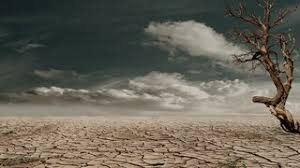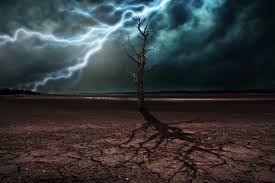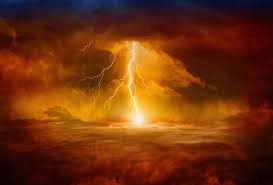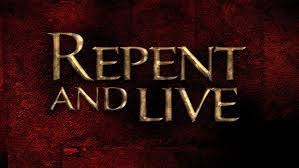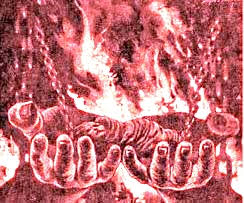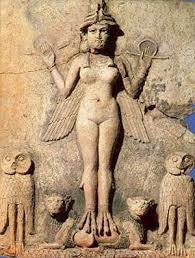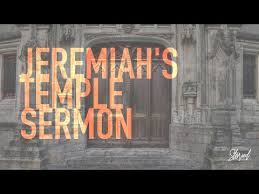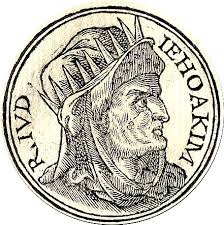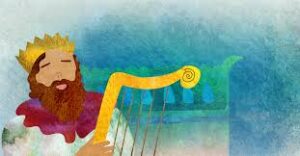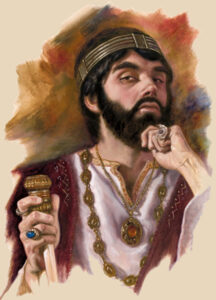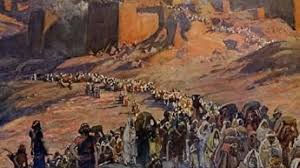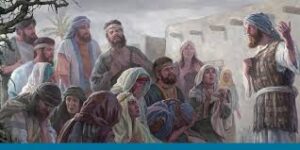Ck – Jerusalem’s Judgment Inescapable 14:7 to 15:4
Jerusalem’s Judgment Inescapable
14:7 to 15:4
Judah’s judgment inescapable DIG: On what basis do the people hope God will rescue them? What do you think was the most effective part of their appeal? Why is YHVH fed up with them and their cries? Why should Jeremiah pray for them, as a true prophet would (see First Samuel 7:8 and Jeremiah 12:23)? What will happen to the false prophets (14:14-18)? What irony do you see here? What was the dilemma of the people? How could they know who was the true prophet (Deuteronomy 18:20)? How can we tell today? What does the Bible have to say about extra-biblical prophecy today? In what ways are we held accountable? Though told not to pray for the people, what is Yirmeyahu doing in his third appeal? What is the basis of the prophet’s appeal on behalf of the rejected people (Leviticus 26:44-45)? Does the LORD soften up? Why or why not?
REFLECT: Do you think God’s patience finally wears out? At what points? Does patience have to have a time limit? What becomes of limitless patience? The false prophets told the kings what they wanted to hear. Do you know someone who says “yes” to avoid rocking the boat? Do you sometimes do that? In your family? At your work? At shul? At church? Has it ever gotten you into trouble? What trouble do you see stemming from people who only tell others what they want to hear? On the other hand, some people like to “make waves?” Do you? Ritual observances without faith do not impress or please YHVH. Does faith lie beneath your actions? Is there anyone you’re trying to impress or influence other than ADONAI? Do you have an audience of One – or many? How can you or anyone else escape this trap?
608 BC during the eleven-year reign of Jehoiakim
Judgment can be delayed – but not denied. After Josiah had heard what was written in the scroll of the Torah, he tore his clothes (Second Kings 22:11 CJB) because he knew Y’hudah had strayed far from ADONAI. So the king sent his advisors to Huldah the prophetess to inquire of the LORD. She gave no doubt that the curses of Deuteronomy would be carried out and Jerusalem was under the cherem judgment of God, which means that she was devoted to destruction (Second Kings 22:15-17). Therefore, Yerushalayim would be under judgment the entire time Jeremiah was ministering. There was no remedy. The spiritual sickness had reached a point where it had become incurable. The weeping prophet spoke to a people that had a fatal disease called sin.
So Yirmeyahu begins a series of intercessions on behalf of his people. But God rejects each intercession. Sometimes there is a point of no return. The analogy in the Bible is the cup of wrath that is full and overflowing (Job 21:20; Isaiah 51:17 and 22; Jeremiah 25:15; Revelation 14:10 and 16:19). ADONAI would not give Abraham, Isaac and Jacob the Promised Land at a time when the cup of wrath of the Canaanites had not reached its full measure. But when it was overflowing, YHVH brought the Jews back to drive the Canaanites out. Now the Judeans were in the same exact position. The cup of the LORD’s wrath was full and overflowing and the intercessions of Jeremiah would be of no avail. Yirmeyahu’s prayers would go unanswered, but not because he lacked faith. God was fed up with their sin.
The sacrificial system of the Torah was acceptable only if it was done in faith. So faith is not the only key element after the cross, but also before it. Without faith it is impossible to please God (Hebrews 11:6). But Judah was performing those sacrifices on the assumption that they could continue to sin as much as they wanted because the sacrifices would cover their sin, much like many Catholics today with the confessional. Rabbi Sha’ul answered this line of thinking in Romans 6:1-14.
Jeremiah’s first intercession: Although our sins testify against us, do something ADONAI, for the sake of Your name. For we have rebelled (from shuwb); we have sinned against you. Notice how the prayer, which began in contrition also hints that YHVH had not been fully effective. The series of rhetorical questions are almost accusations, for they suggest that Elohim had been a stranger, a traveler, a surprised man, and a powerless warrior. You who are the hope of Isra’el, its Savior in times of distress, why are you like a stranger in the Land, like a traveler who stays only a night? Why are You like a man taken by surprise, like a warrior powerless to save? While there is an admission of guilt, the focus is placed on what is expected of God. You are among us, LORD, and we bear Your name. Isra’el was, and is, a nation that bears His name, so the prophet finished his first intercessory prayer with the appeal: Do not forsake us (14:7-9)!
ADONAI’s first rejection: Ha’Shem gives a crushing response. He provides one of the basic reasons for the rejection: They continually love to wander from one false god to another, to another, to another; they do not restrain their feet from chasing after them. So ADONAI does not accept the Israelites; He will now remember their wickedness and punish them for their sins (14:10).
Then, as if really fed up, God interrupted the intercession and demanded: Do not pray for the well being of this people (14:11). Jeremiah was ordered by God not to pray for his people since they were under judgment (see comments on 7:16). The covenantal situation was so deteriorated that serious conversation between YHVH and Y’hudah was no longer possible. He withdrew from the conversation, for there was nothing more to talk about.150
Not only will their prayers do no good, but their ritual sacrifices of the Torah would also be useless. Although they fast, I will not listen to their cry; though they offer burnt offerings (see the commentary on Exodus Fe – The Burnt offering) and grain offerings (see the commentary on Exodus Ff – The Grain Offering) I will not accept them. Instead, they can only expect judgment. I will destroy them with the sword, famine and plague (14:12). As the dialogue continued the word famine occurs four more times, both as a grim physical reality . . . and as a symbol for the spiritual famine occasioned by the false prophets. As bad as the droughts were, the worst was yet to come.
Jeremiah’s second intercession: The basis for this intercession is that the fault does not lay with the people but the false prophets because they keep lying to the people. Yirmeyahu himself gets confused because he hears prophets speaking in the name of the LORD and saying some pretty strange things. Then Jeremiah said: ADONAI, God! The prophets are telling them, “You won’t see the sword or suffer famine. Indeed, I will give you lasting peace in this place” (14:13). In other words, “You will not be expelled from Judea because she is under God’s protection and He will surely defend her (to see link click Cc – False Religion is Worthless). This Hebrew expression means you will have true, lasting peace in this place. Its as if the prophet was saying, “So it’s not the people’s fault . . . its those pesky prophets. You can limit your judgment to them!”
ADONAI’s second rejection: Then the LORD said to Yirmeyahu: The prophets are prophesying lies in My name. I have not sent them or appointed them or spoken to them. They are prophesying to you false visions, divinations (expressly forbidden by the Torah in Deuteronomy 18:10, but heavily practiced in Isra’el as seen in Second Kings 17:17 and Ezekiel 13:6), idolatries and the delusions of their own minds (14:14). In other words, they made things up! There were a lot of false prophets and Jeremiah’s prophetic voice was minimized. The people had itching ears (Second Timothy 4:3), and those false prophets fed them the lies that they wanted to hear.
Therefore, God will judge these false prophets. This is what ADONAI says about the prophets who are prophesying in My name. I did not send them, yet they are saying: No sword or famine will touch this Land. Those same prophets will perish by the sword and famine. And the people they are prophesying to will be thrown out into the streets of Tziyon because of the famine and sword. Death will be on such a massive scale that there will be no one left to bury them, their wives, their sons and their daughters (14:15-16). They will all die and their death will be a result of their own sin. I will pour out on them the calamity they deserve (see Ae – The Problem of Holy War in the TaNaKh).
Jeremiah then looks upon this scene as described by God and expresses his own grief. Let My eyes overflow with tears night and day without ceasing; for the Virgin Daughter, My people, has suffered a grievous wound, a crushing blow. She had been polluted. Again we see the crying prophet. If I go into the country, I see those slain by the sword; if I go into Yerushalayim, I see the ravages of famine. No matter where the prophet from Anathoth goes, within the walls of Jerusalem or out into the country he sees those who will soon die of famine or the sword. The survivors, both prophet and priest, have gone to a land they know not . . . Babylon (14:17-18).
Jeremiah’s Third Intercession: This time the prophet starts out with a question that he hopes will produce a better answer. Have You rejected Y’hudah totally and completely? Do You despise Yerushalayim? Why have you afflicted us so that we cannot be healed? Actually, when Jeremiah says, “we,” he really means only himself and a few others, not the entire nation. You could count the “we,” on one hand. The prophet again tries a vicarious confession of guilt, saying: We hoped for peace but no good has come, for a time of healing but there is only terror. We acknowledge our wickedness, LORD, and the guilt of our ancestors; we have indeed sinned against You (14:19-20). There had been a long record of disloyalty to ADONAI extending over many generations. But it had reached its culmination when the punishment could no longer be withheld. Therefore, they could only rely on the mercy of YHVH.
Yirmeyahu gives three reasons why God should not destroy the nation. First, for the sake of Your name (the One who keeps His promises) do not despise us. Second, do not dishonor Your glorious throne (in the Temple, in the Most Holy Place where the Shechinah glory was). And third, remember Your covenant with us and do not break it (14:21). But, in reality, the three reasons that the prophet gave for not punishing the nation were the very same reasons why He had to punish the nation. First, because God’s name had been blasphemed by the Jews. Second, Ha’Shem had already been dishonored by the spiritual adultery set up within the Temple itself. And third, the Covenant itself demanded curses and judgment for disobedience.
The prophet acknowledged the LORD’s power in contrast to the idols of wood and stone. Do any of the worthless idols of the nations bring rain? No, those idols cannot cause the droughts to end. Do the skies themselves send down showers? No, it is You, ADONAI our God. Therefore our hope is in You, for You are the One who does all this (14:22). The Talmud states there are three keys that have not been entrusted to a mediator, but are kept in the hands of the One True God: the keys of birth, rain and resurrection (Tractate Sanhedrin 113a). Only the Creator has that power.
ADONAI’s third rejection: Then ADONAI said to Yirmeyahu: Even if Moses and Samuel were to stand before Me, My heart would not go out to this people (15:1a). God chose Moses and Samuel because earlier in Jewish history their intervention did ward off His judgment. Three different times the Bible records how Moshe averted the total destruction of the Jewish people by his intercession (Exodus 32:11-14, 30-34; Numbers 14:13-19; Deuteronomy 9:18-20, 25-29). In the case of Samuel, it’s recorded that twice he saved the nation (First Samuel 7:7-11 and 12:19-25).
The background for Jeremiah (under the inspiration of the Ruach Ha’Kodesh) using Moses and Samuel as examples here is seen in Psalm 99:6-8. God had listened to them earlier in Jewish history. And because of their intercession He did withhold His judgment against a sinful nation. However, if both these men were now living, and were standing together side-by-side with Yirmeyahu and interceding . . . this time their prayers would go unanswered. Ha’Shem would say: Send them away from My presence! Let them go (15:1b)! Sending them away from His presence meant sending them away from the Temple. This pictures the people standing before the LORD in the Temple, where they had appeared bringing sacrifices and invoking His help by prayer. YHVH was determined to throw the people out of the Land and into either death or captivity.
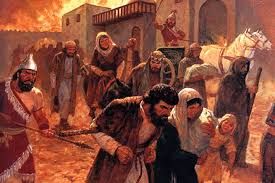
The four destroyers: And if they ask you, “Where shall we go if we are denied God’s mercy?” the prophet was supposed to give them a sarcastic direction: each to their own specific destination. This is what ADONAI said: Those destined for death, to death; those for the sword, to the sword; those for starvation, to starvation; those for captivity, to captivity (15:2). There is no hope. That same fourfold sequence takes on a powerful function in apocalyptic literature as “the four horsemen” (see the commentary on Revelation Ck – The Seven Seals of the Lamb), though the elements are slightly changed. The language here is as harsh and weighty as the TaNaKh permits.
I will send four kinds of destroyers against them, declared the LORD. But now they are the sword to kill and the dogs to drag away and the birds and the beasts to devour and destroy (15:3). In contrast to 15:2, this set of four emphasizes the verbs: kill, drag away, devour, and destroy. The verbs make this formula more awesome and terrifying than those in 15:2. The grand climax to the whole prophecy is that Ha’Shem would make the Jews abhorrent to all the kingdoms of the earth (Deuteronomy 28:25). And the sin that started all of this, although a long process, was what Manasseh (Second Kings 21:10-16, 23-26, 24:3-4) son of Hezekiah king of Judah did in Jerusalem (15:4). The beloved City stands under a sentence of death. Nothing . . . not even the prayers of this passionate prophet, could change that fact. However, we must always keep in mind that because ADONAI never intends to destroy the nation as a whole, and always preserve a remnant (Romans, Chapters 9-11), some will go into captivity.



